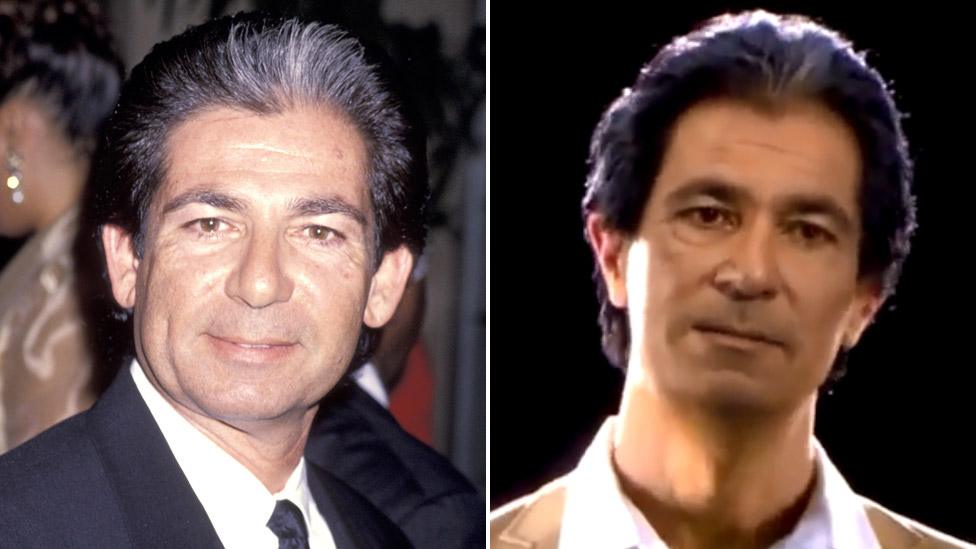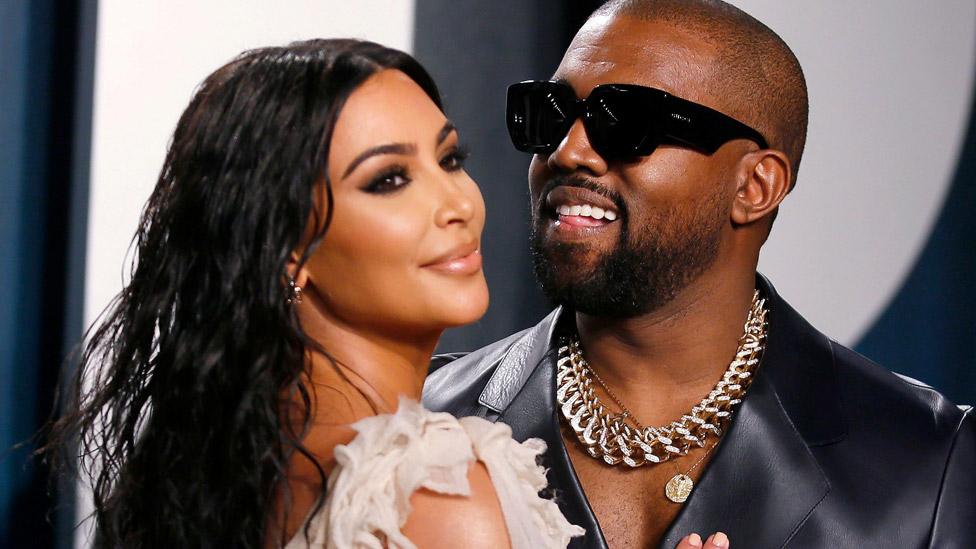Kanye West, Kim Kardashian and her dad: Should we make holograms of the dead?
- Published

Robert Kardashian, pictured left in 1994, has been recreated as a scripted hologram on video
Getting a hologram of a lost loved one might not be on your birthday wish list.
Nor was it on reality star Kim Kardashian West's before she was surprised by husband Kanye West with a "hologram" of her late father Robert for her 40th celebrations.
But in tweets that have since gone viral, she called it "the most thoughtful gift of a lifetime".
Allow X content?
This article contains content provided by X. We ask for your permission before anything is loaded, as they may be using cookies and other technologies. You may want to read X’s cookie policy, external and privacy policy, external before accepting. To view this content choose ‘accept and continue’.
A lawyer and businessman, Robert Kardashian was best known for defending OJ Simpson at his high-profile murder trial in the 1990s. He split from Kim's mother Kris in 1991, and died in 2003.
The talking hologram, which appears as a video, has remarkable visual detail and a pretty well-matched voice. But many people have been unnerved by how the hologram had been scripted by Kanye.
At one point, the hologram says: "You married the most, most, most, most, most genius man in the whole world, Kanye West."
'They become a puppet'
For Per Axbom, a digital ethicist, this poses serious concerns for the rights of individuals after they die.
"Even if a person gives their consent to being used as a hologram, is it even possible for this to be an informed consent?" he asks. "If yes, that would mean that they also give their consent to that same hologram expressing phrases or sentiments that are not part of their belief or value system.
"More than a hologram, they become a puppet. Dangerously, by extension they can become a puppet that can not be discerned from their real self. It will matter who is given control of that puppet."
Kardashian West's reaction to the hologram seemed to be positive - but the same technology that can restore a loved one to digital life can also be used to manipulate footage of those still living, such as politicians, which can lead to powerful disinformation.

Kim Kardashian West with "the most, most, most, most, most genius man in the whole world"
Deepfake technology like that used here on Robert Kardashian's face has also been used to manipulate footage of world leaders ahead of the US election, external, as well as to fake nude images of more than 100,000 women.
You do not need to be in the public eye to be deepfaked or hologrammed - but it helps.
David Ripert, founder of augmented reality firm Poplar Studio, thinks the hologram was achieved using a projection known as Pepper's Ghost along with an actor in front of a green screen. AI deepfake is then used to overlay the face onto the body.
"You can 3D render from a photograph, but it's not as realistic," he says. "If you want to train a model with the father's face you need a lot of footage. Five hundred to 1,000 photos or assets are needed to train a machine. It helps if you have been on television or filmed a lot."
But you only need a few words of audio. "It's speech synthesis. You only need a few words to train the machine."

Robert Kardashian (centre) helped defend American football star and actor OJ Simpson (right) in 1995
Dines, chief creative officer of Studio BLUP, says the technology is still in its early stages and there are lots of giveaways that this is altered footage of Robert Kardashian - mainly the movements and the proportion of his head to his hands.
But what was not necessarily clear - and which Kanye evidently wanted to make obvious by adding in the line about himself - was that he was the one behind it all.
"It shows how easy it is to manipulate. I thought it was tongue in cheek. If Kanye didn't put that line in, people would have said, 'It's so nice'.
"But he did, and that's what's scary about it."
'The woman who has everything in life'
Just days after Kardashian West was criticised for sharing the fact she had flown all of her friends to a private island for her birthday, people have also questioned how sensitive publicising this expensive present might be in the middle of a pandemic.
Allow X content?
This article contains content provided by X. We ask for your permission before anything is loaded, as they may be using cookies and other technologies. You may want to read X’s cookie policy, external and privacy policy, external before accepting. To view this content choose ‘accept and continue’.
But in a world where "death tech" is becoming increasingly popular, and where people are thinking more and more about the digital legacies they leave behind, Kim and Kanye may have prompted a technological ethics discussion about whether we need tighter rules - even if it is currently only for the super-rich.
One day, you or your descendants may want to sign release forms before you or they die, allowing or forbidding the use of your posthumous hologram.
"This has served a massive purpose," says Dines. "What do you do for the woman who already has everything in life? You bring back her dad.
"Rules don't need to be made for that. But this will be made a trend, because everything Kim touches becomes a trend. There will have to be laws in place now."
But David Ripert adds that regulation might not be necessary. "More than laws, there needs to be education around it.
"I think we're just going to have to be trained to question everything. I'm not sure it's such a bad thing that we have to question things."
- Published30 October 2020

- Published28 October 2020
